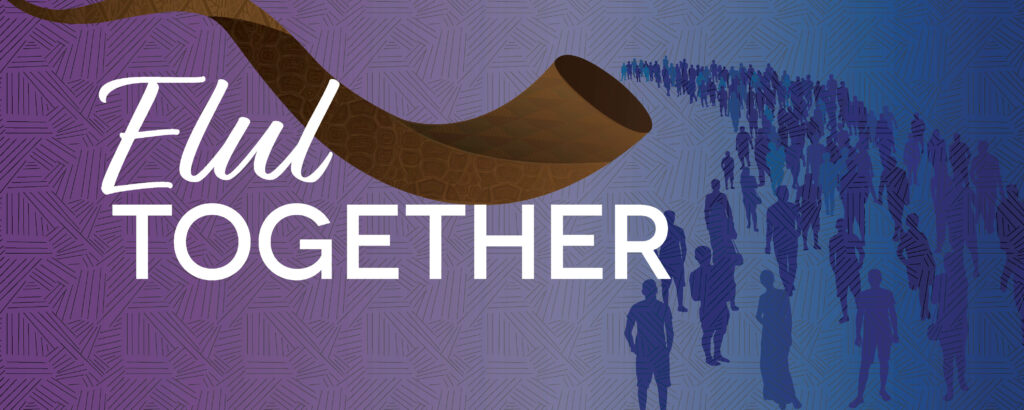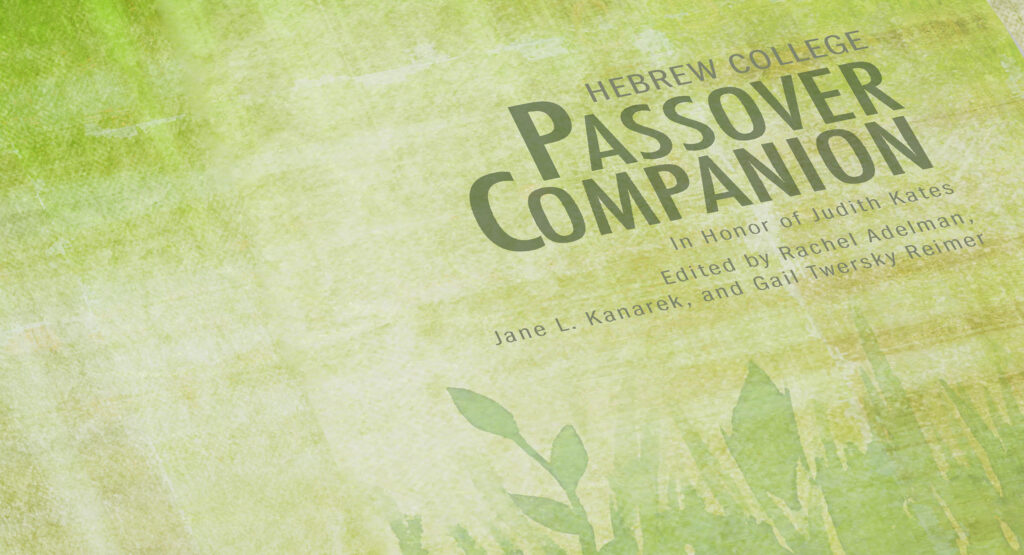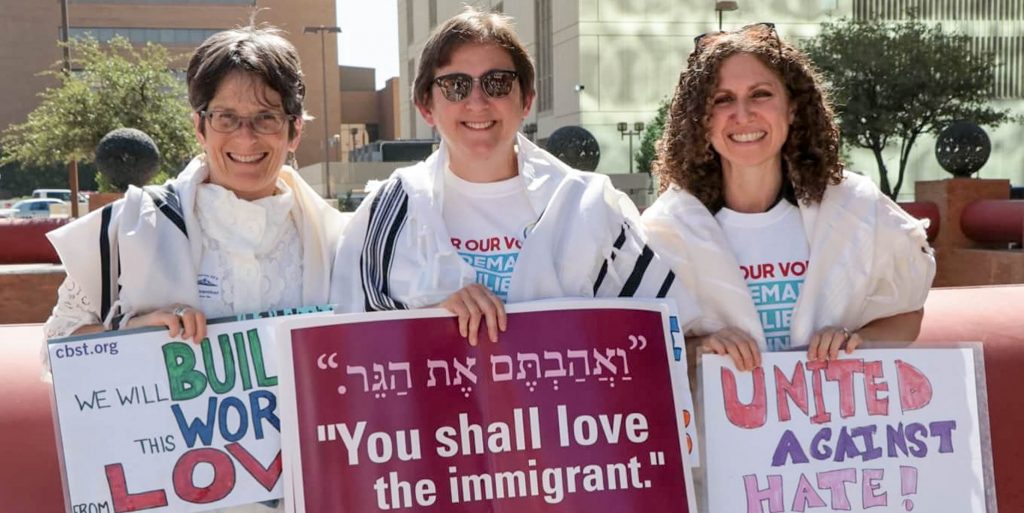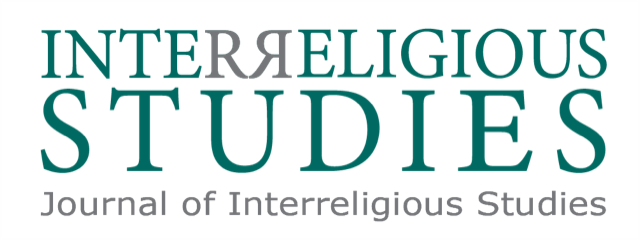Perspectives & Publications
Pluralism, the conviction that various religious, ethnic, racial, and political groups should be allowed to exist on an equal footing and thrive in a single society, is the foundation of our mission at Hebrew College. It is woven into all we do. It affects how we think, how we pray, how we teach, how we study, how we learn. It permeates how we interact within the Jewish community and with the world at large.
Here you’ll find our faculty and leadership’s pluralistic perspectives on the areas most important to Hebrew College: Torah, spirituality and prayer, sustainability, social justice and communal responsibility, creativity, and interreligious work.
Our commitment to pluralism also feels particularly poignant in the current moment. It means that we welcome and embrace the diversity of the Jewish community and of the wider multi-religious and multi-cultural society in which we live. And, it means that we aspire to listen well, to learn with and from each other with humility and curiosity, to approach each other with open hearts and minds.
Rabbi Sharon Cohen Anisfeld, President, Hebrew College
Thought Leadership
On Torah
 Speaking Torah Podcast
Speaking Torah Podcast
In Hebrew College’s podcast “Speaking Torah,” Jewish leaders from around the world read essays from Hebrew College faculty, rabbinical alumni, and leaders about how Torah can help us navigate the most pressing issues of our time. After listening to the podcast, we hope that you will be left feeling inspired, uplifted, and excited to engage with Torah in a modern, transformative way.
Writing
Our On Torah page includes a collection of holiday and parshiot commentary and publications written by Hebrew College faculty, alumni and students.
Seventy Faces of Torah
How can the weekly parashah inform our current busy and complicated lives? Each week in our Seventy Faces of Torah blog , Hebrew College faculty and alumni reflect on the weekly parashah in light of major news events, ongoing social or political issues, or individual or communal concerns in the world like poverty, climate change, spiritual unrest and illness and healing. This weekly series appears on the Hebrew College blog and Patheos.com.
Elul Together
Preparing for the High Holidays in a Time of Upheaval
Elul, the month leading up to the High Holy Days, is traditionally an opportunity for introspection, reflection, and self growth. In response to the isolation of the pandemic, Hebrew College has launched Elul Together: Preparing for the High Holidays in a Time of Upheaval. The project brings teachings, music, and the sound of the shofar into the homes of our broader community during this time of isolation.
Each week of Elul, we post videos, art and journal prompts to accompany you through the next week of High Holy Day preparation. Watch, listen, write, make art, and share your reflections on social media with #ElulTogether. We’re in it together.
On Psalms
 Spiritual Resources for Contemporary Life
Spiritual Resources for Contemporary Life
On Hebrew College’s The Book of Psalms: Calling Out from the Depths website, a unique collection of contemporary interreligious reflections on the psalms, clergy, scholars, poets, musicians, activists, and visual artists offer personal reflections on these ancient and time-honored texts in light of contemporary events and mores, building on the wisdom of the past. The website provides a timely spiritual anthology that includes multimedia resources and new pathways into the biblical texts and stirring meditations on life.
The Psalms is that this site is intentionally interreligious. While it is true that for centuries Jews and Christians have turned to this collection for guidance and inspiration, there have been far fewer opportunities for members of these two communities and others to explore the sources together as fellow seekers. What do we share in common? Where do we differ? How might reading these texts through the lens of the “other” impact our understanding of life and our celebrations and struggles of what it means to be human?
Holiday & Special Publications
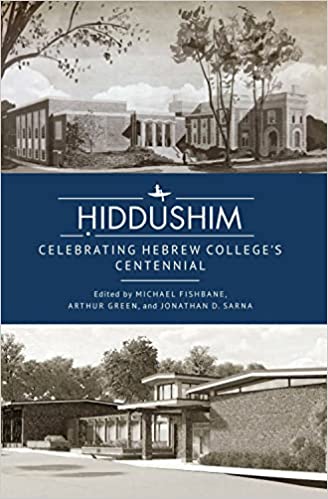 Hiddushim: Celebrating Hebrew College’s Centennial
Hiddushim: Celebrating Hebrew College’s Centennial
Hiddushim, Hebrew College’s special centennial book, was commissioned by the College for its 100th year in 2021-2022.
The book contains a compilation of essays on Jewish studies alongside powerful personal memoirs from the College’s earliest years until today.
>> Order Now
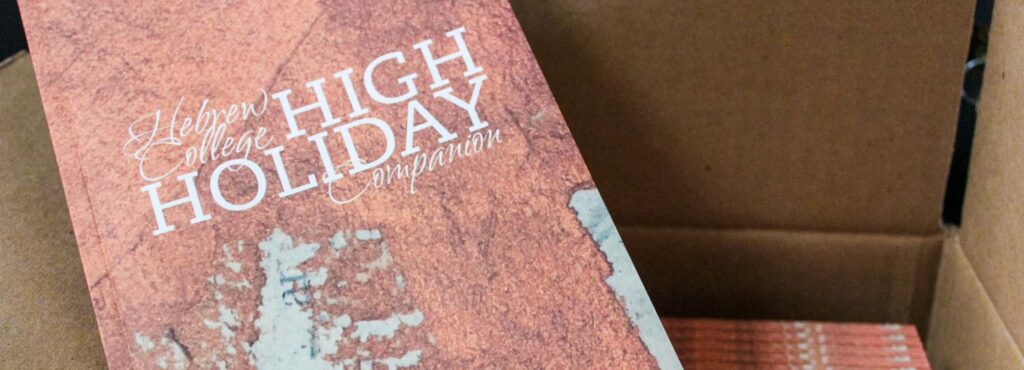
Hebrew College High Holiday Companion
Jewish tradition teaches that as we traverse the winding path of teshuvah (return and renewal) each year during the High Holy Day season, it is wise to do so with fellow seekers. To help guide your steps, the faculty, alumni, and students of Hebrew College created a High Holiday Companion—a collection of reflections on the prayers, scriptural readings, and sacred practices of Rosh Hashanah and Yom Kippur. Featuring original essays, poetry, and visual artwork, this booklet will help illuminate the way into the High Holiday liturgy and these sacred days of return and renewal.
Hebrew College Passover Companion
Published in March 2020, the Hebrew College Passover Companion is a collection of essays that temerged out of a desire to honor our friend and colleague, Dr. Judith Kates. Professor, author, teacher, and scholar, Kates stands among the pioneers of contemporary Jewish women reclaiming their Jewish literary heritage by bringing a feminist perspective to the interpretation of classical Jewish texts. The Passover Companion represents a unique collaboration among faculty, staff, alumni, and friends of Hebrew College. Following after the Hebrew College High Holiday Companion, it offers a pathway into another of our central ritual moments—the Passover seder. — Rachel Adelman, Jane L. Kanarek, and Gail Twersky Reimer, Editors.
Prayer & Musical Prayer Leadership
Music for Healing
During the 2023 Israel-Hamas War, Hebrew College is offering opportunities for prayer by singing nigunim together in community. Through events like “Nigun and Nehama (Song & Comfort),” members of the Greater Boston community join the Hebrew College community to create an hour of healing and hope.
Responding to COVID-19
Hebrew College faculty, students, and alumni, have responded to the pandemic with words of Torah and art for this moment. In addition, Rabbinical School alumna Rabbi Suzanne Offit`09 created the online event “Time to Mourn: Grieving in the Time of COVID, where we paused to mourn those lost during the COVID pandemic thus far. The event was aired on the 17 of Tammuz, Shivah Asar B’Tammuz. Visit our response web page and watch the event below.
Music & Prayer Leadership
At Hebrew College, our students and alumni are using music in innovative and creative ways for their prayer leadership — infusing traditional Jewish liturgy and prayer forms, as well as contemporary, experimental, and world music to create meaningful tefilah and learning for their communities.
Sustainability & Environmental Justice
Big Bold Jewish Climate Fest
Hebrew College has been a co-sponsor of the Big Bold Jewish Climate Fest, a virtual and collaborative annual winter festival by and for people who want to activate Jewish values to move the needle on climate change. IHebrew College faculty and alumni have presented at several online sessions—from “Rabbinical Training and Jewish Leadership in an Era of Climate Crisis” with Hebrew College President Sharon Cohen Anisfeld to “Songs to Sustain Us in the Struggle: A Motzei Shabbat Sing” with Hebrew College alumni Rabbi Shoshana Meira Friedman `14, and Rabbi Micah Shapiro `15.
A playlist of the 2021 Hebrew College session may be viewed on the College’s YouTube channel here.
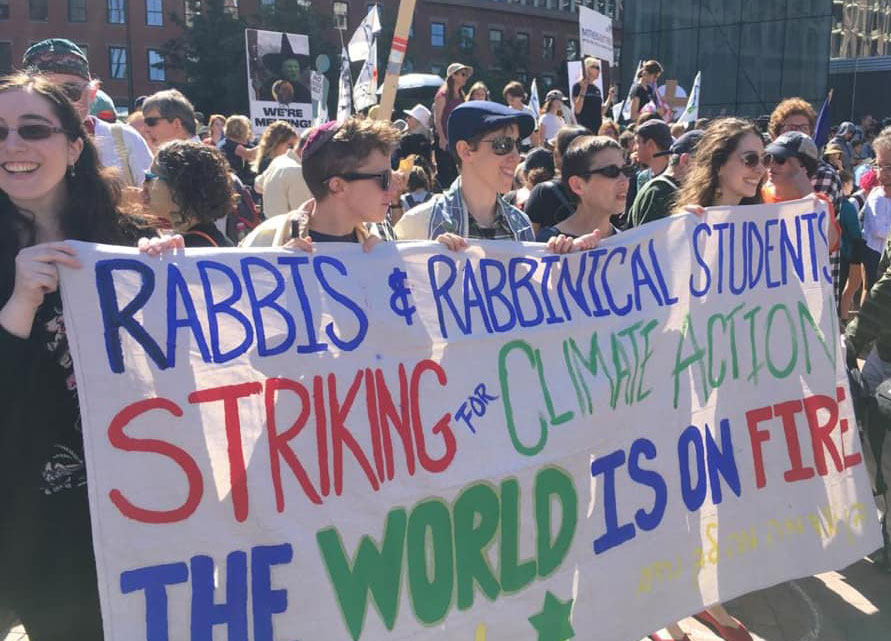
Global Climate Strike
Hebrew College students, faculty, and staff joined the 2019 Climate Strike in Boston, part of the Global Climate Strike, some marching from earth-themed morning davening at the Boston Synagogue
 Sustainability Committee
Sustainability Committee
Led by rabbinical and cantorial students, Admat Kodesh, the Hebrew College Sustainability Committee organizes a number of green initiatives, including College-wide composting and carpooling, and helped the College attain the Hazon Seal of Sustainability.
Hebrew College in Israel
As part of our newly-enhanced Year-in-Israel program for rabbinical students, funded by generous support from the Germanacos Foundation, students will be spending several days at the Arava Institute for Environmental Studies on Kibbutz Ketura, learning with students from throughout the Middle East who are preparing to meet the region’s environmental challenges.
Teens Supporting Sustainability
Teen Students from the Jewish Teen Foundation of Greater Boston, a Hebrew College program that teaches local high school students about fundraising, civic leadership, and grant-making, gave $17,548 of the $60,265 they raised in 2018-2019 to environmental organizations “to preserve the environment for future generations.”
Social & Racial Justice
Prayer for interfaith vigil at Tornillo Detention Camp – Hebrew College President Rabbi Anisfeld joined a national delegation of labor, educational, and faith leaders organized by the American Federation of Teachers (AFT) at the Texas border calling for an end to the inhumane policy of family separations and detentions and the violations of the basic rights of asylum seekers. President Anisfeld offered this prayer during an interfaith vigil at the Tornillo Detention Center where children are still being held.
Voices of Resilience – At this special Hebrew College event, guests Reverands Mariama White-Hammond and Fred Small, and Rabbi Shoshana Meira Friedman`14, share their thoughts on hope, optimism and the yearning for goodness.
Something of Redemption – Rabbi Dan Judson, Dean of the Rabbinical School of Hebrew College, relates Parashat Balak and the famous verse “How goodly are your tents O Jacob, your dwelling places O Israel!/Mah tovu ohalekha Yaakov, mishkanotekha Yisrael” and the theme of redemption to the immigration and family separation struggles in America during the summer of 2018.
#WeToo – President Sharon Cohen Anisfeld addresses the Jewish response to the #MeToo movement.
Interreligious Partnerships
State of Formation
Founded as an offshoot of the Journal of Interreligious Studies (JIRS), the State of Formation is a blog sponsored by the Betty Ann Greenbaum Miller Center for Interreligious Learning & Leadership at Hebrew College and Boston University School of Theology.
Journal of Interreligious Studies (JIRS)
The Journal of Interreligious Studies provides a vehicle for academic discourse to effect practical change in the field of inter-religious dialogue. The Journal of Interreligious Studies seeks to bring together religious, civic, academic, and non-profit leaders of all ages and backgrounds to ensure that lessons derived from scholarship are directly applied through practical programming for religious communities through peer-reviewed content.
JIRS is a publication of the Boston University School of Theology, Hebrew College and Hartford International University for Religion and Peace.

COVID Youth Commission
In March 2021, Hebrew College’s Miller Center for Interreligious Learning & leadership and The Center for Teen Empowerment teamed up to start the Covid Youth Commission (CYC). The commission is composed of a diverse group of youth (26 + mentors) from Greater Boston who are passionate about addressing the challenges of the COVID-19 pandemic, including some longstanding justice issues that this health crisis has brought to light or exacerbated. The students work on three project teams—The Advocacy Team, The Direct Service Team, and The Multimedia Team—and with local partner organizations on food sustainability issues, creating COVID kits for homeless shelters, and on communicating the work of the project to local and national experts. Learn more.
PsalmSeason
In response to the unfolding global pandemic and upheaval over racial injustice, on June 8, 2020 The Miller Center and Interfaith Youth Core launched a new digital initiative on the Book of Psalms entitled PsalmSeason: An Online Encounter with the Wisdom of the Psalms. The multifaceted project seeks to provide people with a creative context in which to explore their swirling thoughts and feelings through the prism of this ancient and beloved collection of prayer-poems. The project began with an online PsalmSeason Concert on June 8, followed by the launch of the PsalmSeason digital platform—an 18-week exploration of the Psalms focusing one psalm each week.
Creativity & the Arts
Hebrew College Arts Exhibits
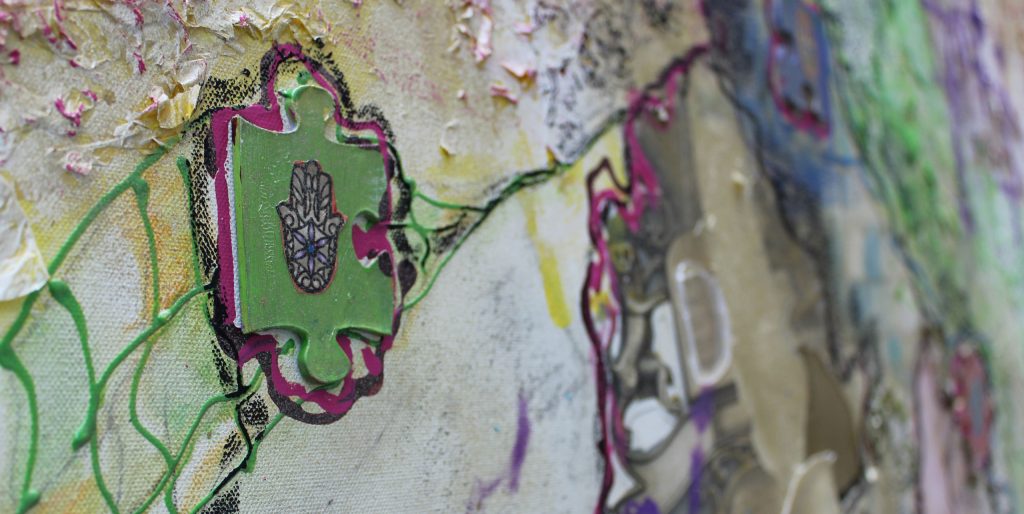
In 2021, Hebrew College established its Arts Initiative in keeping with the College’s long-standing mission of fostering love of Torah, social justice, pluralism, and creativity. Our exhibitions are open to the public, providing access to learning and on-going conversation. Learn more.

Glitz, Glam, and God
Hebrew College alumna and entrepreneur Rabbi Adina Allen`14, co-founder of the Jewish Studio Project – an arts-based nonprofit in Berkeley, CA that blends traditional Jewish learning with a creative arts studio – infuses creative art and writing into her interpretation of Torah. Read more in Glitz, Glam and God.
On Being Caught in the Thicket – Hebrew College President, Rabbi Sharon Cohen Anisfeld, infuses poetry with Torah in this piece about Rosh Hashanah.
Godly Play – Watch Rabbi Dr. Michael Shire, a pioneer in the creative field of Jewish education, use the creative “Godly Play” storytelling method to bring Torah to children.
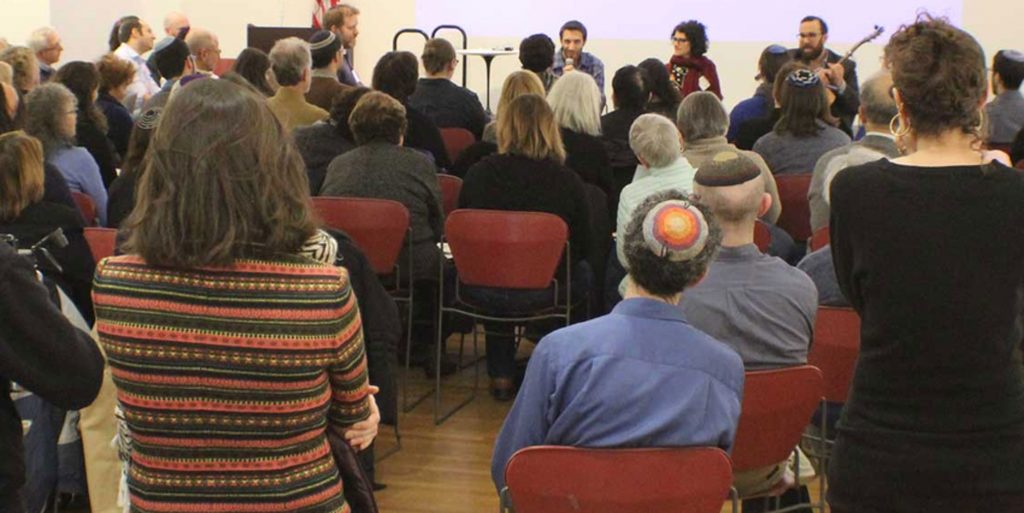
-
- Communal Singing – In this bonus podcast episode of “Judaism Unbound,” recorded live at Hebrew College, host Lex Rofeberg, MJEd`18 (holding microphone below) enters into conversation with Hebrew College alumni Rabbi David Fainsilber, Rab`14, rabbi of The Jewish Community of Greater Stowe, and Rabbi Jessica Kate Meyer, Rab`14, rabbi and chazzan of The Kitchen in San Francisco (pictured below). The panel was part of a Hebrew College conference entitled “The Past and Future of Synagogues.”
Synagogues & Economics
Rethinking Synagogue Dues
Rabbinical School Dean Rabbi Dan Judson, an expert on synagogue dues, was the featured guest on two December 2018 episodes of the podcast Judaism Unbound: “From Selling Dues to Temple Pews” and “Pennies from Heaven…and Building Upkeep.” His book Pennies for Heaven: The History of American Synagogues and Money was named a finalist for the Celebrate 350 Award by The National Jewish Book Council in January 2019.
Selected Faculty Publications
- With the Best of Intentions: Interreligious Missteps and Mistakes, co-edited by Rabbi Or Rose, Director of the Miller Center of Interreligious Learning and Leadership, won first place in the “Ecumenism or Interfaith Relations” category of the Catholic Media Association’s 2024 Book Awards.
- Why Rain Comes From Above: Explorations in Religious Imagination by Dr. Devora Steinmetz is a book of essays, each of which weaves together biblical and rabbinic texts, inviting the reader into a thick experience of reading and of imagining themselves into our stories, prayers, and practices.
- Stop Look and Listen: Celebrating Shabbos Through a Spiritual Lens (2022) by Rabbi Nehemia Polen examines the three stages of a full day of uninterrupted practice, tied to the natural cycle of the sun’s setting, rising, and setting again.
- Words to Live By: Sacred Sources for Interreligious Engagement (2018) co-edited by Rabbi Or Rose and Rev. Soren Hessler of Hebrew College’s Miller Center for Interreligious Learning & Leadership, and Dr. Homayra Ziad of the Institute for Islamic, Christian , and Jewish Studies.
- National Jewish Book Award Finalist: Pennies from Heaven: The History of American Synagogues and Money (2018) by Rabbi Dan Judson, Dean of the Rabbinical School of Hebrew College, and expert on synagogue dues. Synopsis: In the annals of American Jewish history, synagogue financial records have been largely overlooked. But as Rabbi Judson shows in his examination of synagogue ledgers from 1728 to the present, these records provide an array of new insights into the development of American synagogues and the values of the Jews who worshipped in them. Looking at the history of American synagogues through an economic lens, Judson examines how synagogues raised funds, financed buildings, and paid clergy. By “following the money,” he reveals the priorities of the Jewish community at a given time.
- Learning to Read Talmud: What it Looks Like and How it Happens (2017) co-edited by Rabbi Jane Kanarek, Rabbinical School Associate Professor of Rabbinics and Marjorie Lehman. Synopsis: Learning to Read Talmud is the first book-length study of how teachers teach and how students learn to read Talmud. Through a series of studies conducted by scholars of Talmud in classrooms that range from seminaries to secular universities and with students from novice to advanced, this book elucidates a broad range of ideas about what it means to learn to read Talmud and tools for how to achieve that goal. Bridging the study of Talmud and the study of pedagogy, this book is an essential resource for scholars, curriculum writers, and classroom teachers of Talmud.
- Rabbi Zalman Schachter-Shalomi: Essential Teachings (2020) by Rabbi Or N. Rose (Editor), Netanel Miles-Yépez (Editor), Orbis Books. Rabbi Zalman Schachter-Shalomi (1924-2014) was one of the most creative and influential Jewish spiritual teachers in the late twentieth-century. Reb Zalman (as he is known) made several distinctive and lasting contributions to Jewish and interreligious life in North America and beyond. Originally trained as a Hasidic rabbi within the Chabad-Lubavitch community, he became one of the great teachers and translators of Jewish mystical tradition.
- From Tiberias, With Love: A Collection of Tiberian Hasidism, volume I: Rabbi Menachem Mendel of Vitebsk (2020), edited by Aubrey Glazer and Nehemia Polen, Fons Vitae Press. A journey to rediscovering the magic and mystery, the intimacy and depth of a lost moment in the history of a remarkably relevant, and conscious community in the Galilee that still has much to teach us.


